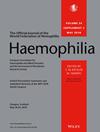Evaluating the benefits of emicizumab prophylaxis for haemophilia A with inhibitors: A cost-effectiveness and budget impact analysis in Thailand's upper-middle income setting
Abstract
Background
In Thailand, an upper-middle-income country, managing haemophilia A (HA) with inhibitors poses significant challenges, often necessitating bypassing agents (BPAs) for bleeding control. This study evaluates the cost-effectiveness and budget impact of emicizumab, a novel prophylactic agent, as an alternative to both episodic and prophylactic BPA treatments from a societal perspective.
Methods
A Markov model was employed to estimate the lifetime societal costs and outcomes of emicizumab prophylaxis for HA patients with inhibitors. Treatment efficacy, cost, and epidemiological data were obtained through a comprehensive literature review and incorporated into the model. A 5-year budget impact analysis complemented the cost-utility analysis, with a 3% annual discount rate applied to future costs and outcomes.
Results
In the base-case scenario, emicizumab prophylaxis in HA patients aged 2 years and above demonstrated superior cost-effectiveness, yielding 18.1 quality-adjusted life years (QALYs) per patient over a lifetime and resulting in cost savings of 138 million Thai Baht (THB) compared to BPA prophylaxis. Compared to episodic BPA treatment, emicizumab yielded 30.5 QALYs and saved 25 million THB per patient. The 5-year budget impact was projected at 1775 million THB.
Conclusions
Emicizumab offers a cost-saving approach for HA treatment with inhibitors in Thailand, promising significant health benefits and budgetary savings. This supports its potential inclusion in Thailand's National List of Essential Medicines to enhance haemophilia care access.
Highlights
- Managing haemophilia A (HA) with inhibitors in Thailand, an upper-middle-income country, faces challenges due to limited access to effective treatments or newer drugs for bleeding management.
- Emicizumab prophylaxis found to as a cost-effective and viable alternative to traditional treatments, effectively preventing bleeding in Thai HA patients over 2 years old with inhibitors.
- Demonstrating improved clinical outcomes and reduced costs, emicizumab prophylaxis outperforms episodic BPA treatments, positioning it as a superior treatment option for HA patients with inhibitors in Thailand.

 求助内容:
求助内容: 应助结果提醒方式:
应助结果提醒方式:


